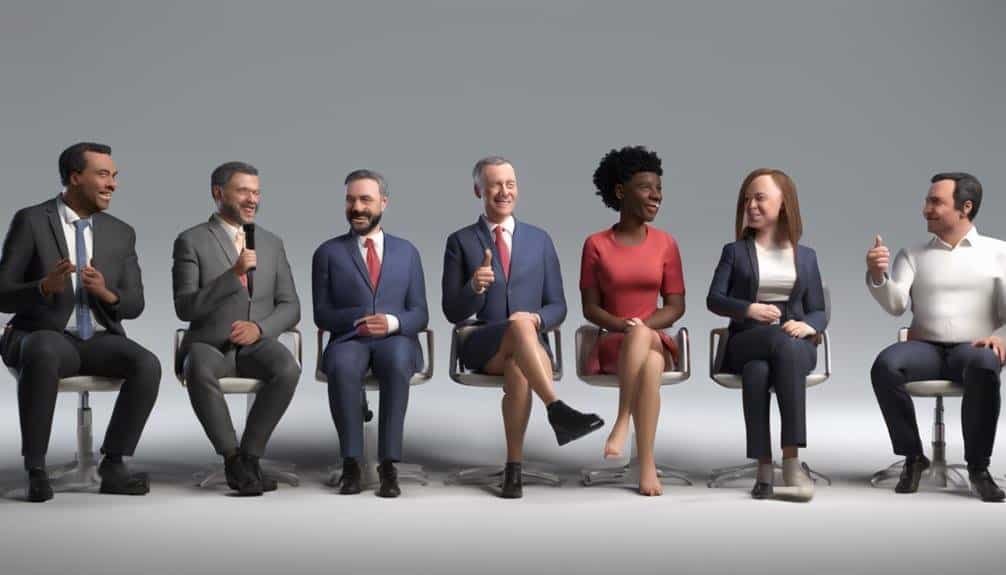How Does Your Personality Influence Your Political Views?
Your personality shapes your political views immensely. Traits like extraversion, conscientiousness, openness, and agreeableness influence your ideologies and policy preferences. For instance, extraverts may be more politically engaged, while conscientious individuals tend to participate more in elections. Openness to new experiences can impact your support for progressive policies, and agreeableness may steer you towards specific ideologies. Understanding these connections can provide vital insights into why you hold certain political beliefs. Your personality isn't just who you are – it's also a key factor in shaping your political perspective.
Key Takeaways
- Extraversion impacts political engagement and leadership interest.
- Conscientiousness influences voter turnout and election participation.
- Openness to experience shapes political decision-making and views.
- Agreeableness affects policy support and ideological preferences.
- Personality traits align with partisan affiliation, shaping political beliefs.
Big Five Personality Traits
Understanding the Big Five Personality Traits is essential for comprehending how individuals' inherent characteristics influence their political views. Among the Big Five traits, political engagement is greatly influenced by extraversion. People who are extroverted tend to be more socially outgoing and assertive, making them more inclined to participate in political discussions, campaigns, and activities. This trait often correlates with a higher level of political engagement and interest in leadership roles within political spheres.
Leadership qualities, another aspect of the Big Five traits, play a significant role in shaping political views. Individuals high in extraversion and conscientiousness are more likely to exhibit leadership qualities such as decisiveness, charisma, and proactiveness. These traits can influence their political preferences, as they may gravitate towards positions of authority and engage more actively in political processes.
Extraversion and Political Preferences
Extraversion significantly influences individuals' political preferences, shaping their inclination towards certain ideologies and political figures. People high in extraversion tend to be outgoing, sociable, and energized by social interactions. These individuals often favor political parties or candidates that promote social engagement, community involvement, and inclusivity.
When it comes to voting, extraverts may be more likely to participate actively in the political process, attending rallies, engaging in discussions, and promoting their preferred candidates. Their enthusiasm for public speaking and campaigning can make them effective advocates for causes they believe in, influencing others through their charismatic and persuasive communication style.
On the other hand, introverted individuals, who are more reserved and reflective, may prefer political platforms that focus on individual rights, privacy, and autonomy. Understanding how extraversion influences political preferences sheds light on the diverse factors that shape our views and choices in the political landscape.
Conscientiousness and Voting Behavior
Conscientiousness plays a significant role in determining voter turnout and participation in elections.
Individuals high in conscientiousness are more likely to take their civic duties seriously and engage in the voting process.
This personality trait can influence how individuals approach political decisions and contribute to shaping their voting behavior.
Conscientiousness and Turnout
An individual's level of conscientiousness greatly influences their likelihood of turning out to vote in elections. Conscientiousness, as a personality trait, plays a significant role in shaping voter engagement and behavior. Here are some key points to ponder:
- Conscientious individuals tend to be organized and responsible, making them more likely to prioritize voting.
- High levels of conscientiousness are associated with a strong sense of duty, leading to a higher voter turnout.
- Conscientious voters are more likely to research candidates and issues before casting their votes.
- The conscientiousness trait contributes to a sense of civic duty, motivating individuals to participate in the electoral process.
Understanding how conscientiousness impacts voter turnout provides valuable insights into the relationship between personality traits and political engagement.
Personality Traits and Voting
Individuals with varying personality traits exhibit distinct patterns of behavior when it comes to voting in elections. Personality types and ideology alignment play a significant role in shaping voter behavior.
For instance, individuals high in conscientiousness are more likely to be detail-oriented, organized, and responsible. This trait often translates into a higher likelihood of voting due to their sense of duty and commitment to follow through on tasks. Conscientious individuals are more inclined to research candidates, understand policy implications, and make informed decisions at the polls.
On the contrary, those lower in conscientiousness may be more prone to procrastination or disorganization, potentially impacting their voter turnout. Understanding how personality traits intersect with voting behavior can provide valuable insights into the electoral process and citizen engagement.
Openness to Experience in Politics
Openness to experience plays a significant role in shaping individuals' political views and decision-making processes. People high in openness tend to be more receptive to new ideas, different perspectives, and unconventional solutions, which can greatly impact how they engage with politics. Here are a few key ways in which openness to experience influences politics:
- Embracing Creativity in Governance: Individuals high in openness are likely to support creative and innovative approaches to governance. They're more inclined to explore new policies, promote artistic and cultural initiatives, and advocate for out-of-the-box solutions when contemplating new societal challenges.
- Fostering Adaptability in Leadership: Open individuals are more comfortable with change and adaptability, making them more supportive of leaders who are flexible, open to feedback, and willing to adjust their strategies based on new information. This adaptability in leadership can lead to more responsive and effective governance.
- Encouraging Diversity in Decision-Making: Openness to experience is associated with a willingness to entertain a diverse range of opinions and perspectives. This can promote inclusive decision-making processes that take into account the needs and viewpoints of various groups within society.
- Supporting Progressive Policies: People high in openness are more likely to endorse progressive policies that challenge traditional norms and promote social change. Their willingness to embrace new ideas and values can lead to the advancement of policies aimed at fostering equality, diversity, and innovation in society.
Agreeableness and Policy Support
Agreeableness greatly influences the level of support for various policies within a political context. Individuals high in agreeableness tend to prioritize harmony, cooperation, and empathy, which can shape their policy preferences and political ideology. Research suggests that those with high agreeableness scores are more inclined to support policies that promote social welfare, equality, and peace. They're likely to endorse policies focused on healthcare access, education funding, environmental protection, and diplomatic solutions to conflicts. This alignment stems from their empathetic and compassionate nature, driving them towards policies that aim to improve the well-being of others and foster societal harmony.
Conversely, individuals low in agreeableness may exhibit a preference for policies that prioritize individual freedoms, free-market principles, and national security measures. Their lower emphasis on empathy and cooperation can lead them to support policies that prioritize personal responsibility, economic growth, and military strength. Understanding how agreeableness influences policy support provides valuable insights into the relationship between personality traits and political attitudes.
Neuroticism and Political Beliefs
Neuroticism can greatly influence the formation of political beliefs and attitudes. Individuals high in neuroticism tend to exhibit higher levels of anxiety, fear, and emotional instability, which can impact their political views in several ways:
- Impact of neuroticism on voting patterns: Neurotic individuals may be more prone to making decisions based on fear or emotional reactions rather than rational analysis. This can lead them to support policies or candidates that promise security or stability, even if those promises lack substantial evidence.
- Influence of neuroticism on policy beliefs: High levels of neuroticism can also shape one's stance on various policy issues. For instance, individuals high in neuroticism may be more inclined to support policies that prioritize safety and protection, even if those policies come at the cost of personal freedoms or economic growth.
Understanding how neuroticism influences political beliefs is essential in comprehending the diverse array of viewpoints present in society and the underlying psychological factors that drive them.
Personality and Partisan Affiliation
The alignment of one's personality traits with a particular partisan affiliation can provide valuable insights into the dynamics of political identification. Research suggests that individuals tend to gravitate towards political parties that resonate with their core values and behavioral tendencies. Personality and ideology alignment play a significant role in shaping one's political beliefs and party preferences.
Partisanship and personality compatibility are intertwined in a complex manner. For instance, individuals high in openness to experience may lean towards parties that embrace progressive policies and novel ideas. Conversely, those with a strong preference for tradition and structure may find themselves aligning with conservative parties. Extroverted individuals might be drawn to parties that emphasize social interactions and networking, while introverts may feel more comfortable in parties that prioritize individual autonomy.
Understanding the relationship between personality and partisan affiliation can help explain why individuals are drawn to specific political ideologies and parties. By recognizing these connections, we can gain a deeper understanding of the diverse motivations behind political identification.
Implications for Political Discourse
When examining the influence of personality on political views, it becomes evident that understanding these connections can have a significant impact on the quality of political discourse. By recognizing how individual traits shape beliefs and attitudes, it's possible to navigate conversations more effectively and foster a more constructive dialogue.
- Adopting Effective Communication Strategies: Tailoring communication methods based on personality types can enhance understanding and prevent misunderstandings.
- Emphasizing Active Listening: Actively listening to opposing viewpoints can create empathy and open doors for meaningful discussions.
- Promoting Respectful Dialogue: Encouraging respect for diverse opinions is essential in maintaining civil discourse and fostering tolerance.
- Bridging Divides through Compromise: Acknowledging personality-driven differences can lead to finding common ground and reaching compromises that benefit all parties involved.
Conclusion
To sum up, your unique personality plays a significant role in shaping your political views.
The Big Five Personality Traits offer insight into how traits like extraversion, conscientiousness, openness to experience, agreeableness, and neuroticism influence your political preferences, voting behavior, policy support, beliefs, and partisan affiliation.
It's important to recognize and understand how your personality influences your political views to engage in more meaningful and productive political discourse.








